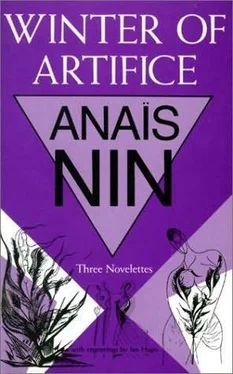Anaïs Nin - The Winter of Artifice
Здесь есть возможность читать онлайн «Anaïs Nin - The Winter of Artifice» весь текст электронной книги совершенно бесплатно (целиком полную версию без сокращений). В некоторых случаях можно слушать аудио, скачать через торрент в формате fb2 и присутствует краткое содержание. Год выпуска: 2007, Издательство: Sky Blue Press, Жанр: Классическая проза, на английском языке. Описание произведения, (предисловие) а так же отзывы посетителей доступны на портале библиотеки ЛибКат.
- Название:The Winter of Artifice
- Автор:
- Издательство:Sky Blue Press
- Жанр:
- Год:2007
- ISBN:нет данных
- Рейтинг книги:4 / 5. Голосов: 1
-
Избранное:Добавить в избранное
- Отзывы:
-
Ваша оценка:
- 80
- 1
- 2
- 3
- 4
- 5
The Winter of Artifice: краткое содержание, описание и аннотация
Предлагаем к чтению аннотацию, описание, краткое содержание или предисловие (зависит от того, что написал сам автор книги «The Winter of Artifice»). Если вы не нашли необходимую информацию о книге — напишите в комментариях, мы постараемся отыскать её.
“A handful of perfectly fold fables, and prose which is so daringly elaborate, so accurately timed… using words as magnificently colorful, evocative and imagist as any plastic combination on canvas but as mysteriously idiosyncratic as any abstract.”
—
The Winter of Artifice — читать онлайн бесплатно полную книгу (весь текст) целиком
Ниже представлен текст книги, разбитый по страницам. Система сохранения места последней прочитанной страницы, позволяет с удобством читать онлайн бесплатно книгу «The Winter of Artifice», без необходимости каждый раз заново искать на чём Вы остановились. Поставьте закладку, и сможете в любой момент перейти на страницу, на которой закончили чтение.
Интервал:
Закладка:
Boris was saying that Nichols, the caricaturist, had gone insane, and had been sent to the hospital, that Hans ought to go and see him. Hans rubbed his hands with sly glee, shook his head, and danced about, exclaiming: “Superb! Superb! Let’s have a drink to Nichols’ insanity. I want to go and hear what he has to say. I hope he really is insane. That doesn’t happen every day.”
“Your humor is not humor, it’s demolition. You’re always breaking windows. That’s why the air around you is full of oxygen.”
I swallowed his laughter like bread and wine, while he jubilated like a gnome.
Encouraged by the darkness of the garden I began to talk flowingly.
“To-night,” I said, “is a fine dark night in which an artist might well be born. He must be born at night, you know, so that no one will notice that his parets only gave him seven months of human substance. The rest he must always add himself—and he does. He creates himself. He is born with a mania to complete himself, to create himself beyond the womb. His reality is sometimes questionable. One does not know if he survived the frailty of his birth conditions, whether or not he really sits at café tables and stains his fingers with nicotine. He is so multiple and detached, fluid and amorphous, that his central self is constantly falling apart into fragments and is only recomposed by a book, by his work. With his imagination he can flow into all the moulds, multiply and divide himself, and yet whatever he does, he will always be two. He will always be the Indian who worshipped his mistress but who made a flute out of her bone when she died. He will always be the man who weeps when his mistress dies, but who says: ‘A flute made out of human bones has a more haunting, a more penetrating sound’.”
I turned to Andre’s fanatic Celtic eyes for confirmation.
“Take me, for example. I am aware that when men look for the woman in me, the woman suddenly turns into fog, into night, into wind and sky. I am artist. Men run about in the fog looking for a woman. But I am not a being one can lay hold of and keep. I cannot be held and kept like a gold nugget. I am artist. I am fog, rain, tempest, sun, words. I am composed of words and fire and war. Is that clear?”
“You’re never clear,” said Hans brusquely.” I trust neither your ideas nor your way of putting them. You put things so clearly and beautifully, so crystal-clear— it all looks so simple and true. You’re so terribly nimble and clever. I distrust your cleverness. You always make wonderful patterns, I admit. Everything is in its place. Looks convincingly clear—too clear. And in the meanwhile where are you ? Not on the clear surface of your ideas any longer, but submerged, sunk in some dark, obscure realm—like a submarine. One only thinks one has been given all your thoughts. One only imagines you have emptied yourself in that clarity—but there are layers and layers—you’re bottomless, unfathomable. Your clearness is deceptive. You’re the thinker who arouses most confusion in me, most doubts, most disturbances.”
He said all this with great irritation and vehemence. Andre added:
“One feels that she gives you a neat pattern and then slips out of it herself and laughs at you.”
“Furthermore,” said Hans, “you have a half serious way of saying certain things—a funny fantastic twist to your phrases, like the way you talked about yourself just now, which puts one off the track. I know there is something else behind what you are saying—I can’t put my finger on it.”
I laughed. Three distinct feelings invaded me: one was an intellectual realization that in sum Hans’ criticism was flattering; another was a mischievous joy in having irritated, eluded and puzzled him; and finally there was a feeling of bitterness that he should suddenly fight me, attack me.
I sat in the quiet garden rehearsing swiftly, like an ever lost paradise, our days together—confidence, openness, peace. And here was the first sign of war. War. War was to be expected. Inevitable. Hans was war.
I endeavoured vainly to find my gaiety again. I saw that Hans no longer noticed me.
I thought: “Now the two slow-minded ones, the ponderous Hans and Andre have found solidarity against my nimbleness. They think I am not profound because I am swift. Well. I shall be more and more nimble, more and more treacherous.”
Hans said:
“Andre agrees with me that you are far too quick—always too quick, that you take swift decisions, and make swift judgments, and live too quickly, and write too quickly. That your quickness is not to be trusted.”
“That’s my natural rhythm,” I retorted.
“Well, you ought to slow up, that’s all I say.
Slow up. Read more slowly, listen, linger, dwell on things. Ponder them.”
“Well, you need me to focus you. You’re always going astray, with your roundabout ways.”
“Besides, what irritates me is your aristocratic nonchalance, that’s what it is. If I were married to you, I’d make you eat with the servants every day, I’d make you fraternize with everybody. I’d like to see you really friendly with them. Even when you’re kind you appear aloof, even when you’re full of compassion you really remain apart. If there were a revolution to-day, I would side with the people, and you, you’d have your neck cut off immediately. It’s a neck like Marie Antoinette’s, just made to be cut off. It’s too slender…”
I wanted to laugh but I couldn’t. The night, so sweet before, now seemed poisoned. “It’s good that you turn against me, it’s very good, for now I will be true only to myself. It is good because it hardens me, makes me lone and courageous. For I am soft and too easily devoured by my love. Turn against me, and I am alone with myself. I will never bat an eyelash, never weep. I cast you out, and by this new hardness in me, I will live. I have been swallowed by love. Devoured by it.”
In the morning I awoke so heavy, weighed down by my hatred. Hard face and brittle voice. I found Hans waiting for me in the garden. He said:
“I am upset about last night, about my insincerity. I said a lot of things I didn’t mean.”
“Didn’t mean?” I repeated, and waited, all wrapped in my silence and watchfulness.
“Your silences are more terrible than other women’s shoutings and sobbing. Yes. I was carried away by my desire to conceal my love. The truth is I was swept away by your tirade. I wanted to kiss you. And then I saw you looking at Andre with such admiration. Your looking at him bothered me.”
“Perhaps you’re acting again,” I said.
“No,” said Hans quietly. “I can’t lie to you.”
“It’s simply that you enjoy difficulties. You like creating troubles. Our few days of harmony aroused your usual craving for discord, for war.”
“No, you’re wrong. I don’t want war. But for a moment I lost confidence in you. You were so enthusiastic about the astrologer, your voice was so warm when you questioned him and talked with him. Tell me something… Oh, well, what a man wants is to believe that a woman can love him so much that no other man can possibly interest her, even if he be a magician!”
What a man wants! (Then we could have again that openness if I were truthful?)
“What a man wants,” I said, “is what I have given you up to now with a wholeness you can never imagine.”
He looked tender and dazed.
“I feel so battered,” I said. “Our first duel has come to an end.”
“It was all very interesting,” said Hans. “I like launching into a role, into a part which baffles those who believe they know me. When you are angry your eyes turn violet. I would like to write that up in the style you used for the story of the opium fiend.”
Читать дальшеИнтервал:
Закладка:
Похожие книги на «The Winter of Artifice»
Представляем Вашему вниманию похожие книги на «The Winter of Artifice» списком для выбора. Мы отобрали схожую по названию и смыслу литературу в надежде предоставить читателям больше вариантов отыскать новые, интересные, ещё непрочитанные произведения.
Обсуждение, отзывы о книге «The Winter of Artifice» и просто собственные мнения читателей. Оставьте ваши комментарии, напишите, что Вы думаете о произведении, его смысле или главных героях. Укажите что конкретно понравилось, а что нет, и почему Вы так считаете.











